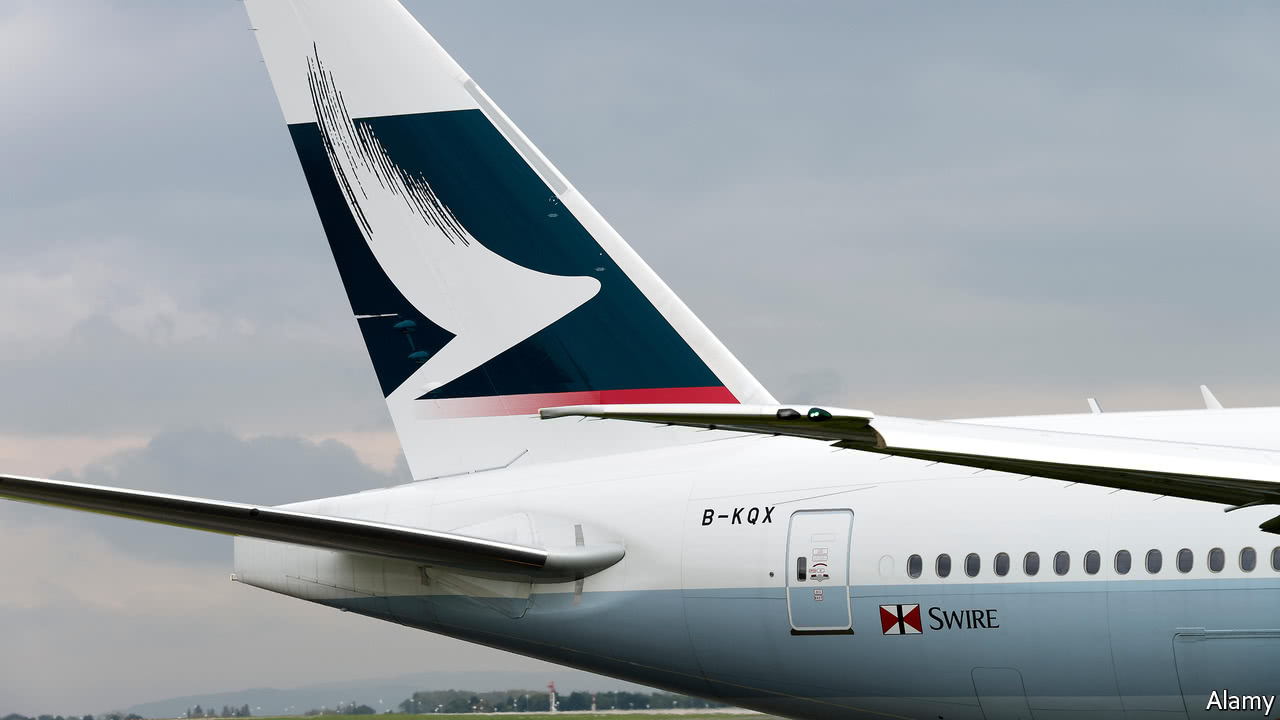
THIS morning’s news that Qatar Airways, a national carrier with global ambitions, has bought nearly 10% of Cathay Pacific, Hong Kong’s flag-carrier, came as a shock for financial markets. Shares in Cathay Pacific dropped in value by around 5% in the minutes after trading resumed first thing today. But the idea that Qatar Airways was the market for another acquisition came as no surprise for analysts in the aviation industry. Since 2015 Qatar has acquired 20% of IAG, a European group of airlines that flies 100m passengers a year, 10% of LATAM, Latin America’s biggest carrier, and 49% of Meridiana, an Italian carrier. It has even been invited by the Indian government to start up a new airline there with 100 jets. So why has Akbar al-Baker, Qatar Airways’ outspoken chief executive, gone on a shopping spree worth billions of dollars?
On the face of it, such a strategy does not look wise. Etihad, a rival to Qatar Airways based nearby in Abu Dhabi, attempted to do the same a few years ago, buying stakes in Air Berlin, Alitalia and Jet Airways. The idea was to use the carriers to feed passenger traffic from Germany, Italy and India via its hub in Abu Dhabi. But the strategy came unstuck this year with the bankruptcy of Air Berlin and Alitalia, the collapse of which some sources estimate may have cost Etihad as much as $4.5bn in losses. Following this path would bring Qatar few rewards especially as, in the words of Greg Waldron of Flightglobal, an online trade journal, “Qatar seems to invest in far flung assets with no clear synergies”.
-
Why Qatar Airways has bought 9.6% of Cathay Pacific
-
A massive trove of data on offshore transactions is leaked
-
Where economic power goes, political power will follow
-
A mass shooting at a church in Texas has left at least 26 dead
-
“The Killing of a Sacred Deer” is a true tragicomedy
-
Tingles of the transcendent don’t always prompt people to go to church
But as Gulliver revealed in an article in this week’s print edition, Mr al-Baker has no intentions of repeating Etihad’s errors. The search for partners abroad is not simply an attempt to drive passenger traffic through its base in Doha. Instead, it is a search for allies in the face of hostility from its neighbours in the Middle East:
Since June, Saudi Arabia, the United Arab Emirates, Bahrain and Egypt have imposed a blockade on Qatar, banning its flag-carrier’s jets from their skies. That has resulted in the cancellation of over 50 daily flights to these countries, costing the airline a tenth of its business and $500m in profit this year, calculates Diogenis Papiomytis of Frost & Sullivan, a consultancy.
But even before the blockade Mr al-Baker surely knew that there were limited growth opportunities in the Middle East. The forces that caused passenger traffic through the region to sky-rocket over the past decade are unwinding. Terror attacks and geopolitical instability have reduced the attraction of transiting through airports such as Doha. Low oil prices have sapped demand for business-class travel from energy companies in the region. Cheaper fuel prices, combined with the introduction of fuel-efficient aircraft such as Boeing’s 787 jetliner, have improved the economics of direct flights between Europe and Asia that do not require a stop in the Middle East.
And so buying up other airlines in the oneworld alliance—of which Qatar Airways, IAG, LATAM and Cathay Pacific are members—seems more sensible than throwing more aircraft and investment at its Doha base. So far the strategy has worked: the share prices of IAG and LATAM have surged since Mr al-Baker first took stakes in the duo. Cathay Pacific also looks like a good bet. Its shares have been performing poorly since it revealed its first annual loss since 2008 earlier this year. But if its managers play their cards right, the Hong Kong-based carrier should be able to benefit from the rapid rise in outbound tourism from mainland China.
Whether this increase in Qatar’s influence in the aviation industry is good for consumers is another question. Most airline bosses Gulliver has met in recent months predict privately that within the next five or ten years, the long-haul international travel market will be controlled by three massive airline groups. This, they predict, will be the result of the members of today’s alliances—oneworld, Skyteam and Star—buying stakes in each other. The Cathay Pacific deal adds more evidence to the argument that Mr al-Baker wants Qatar Airways to be the leader of one of these future goliaths of the aviation industry. So far, the only major oneworld carrier to refuse Qatar’s advance point blank is American Airlines, a determined enemy of the Gulf carriers, which Mr al-Baker tried and failed to buy 10% of earlier this summer. With the global airline business moving towards consolidation, however, how much longer it can resist its rival’s courtship remains to be seen.
Source: economist
Why Qatar Airways has bought 9.6% of Cathay Pacific